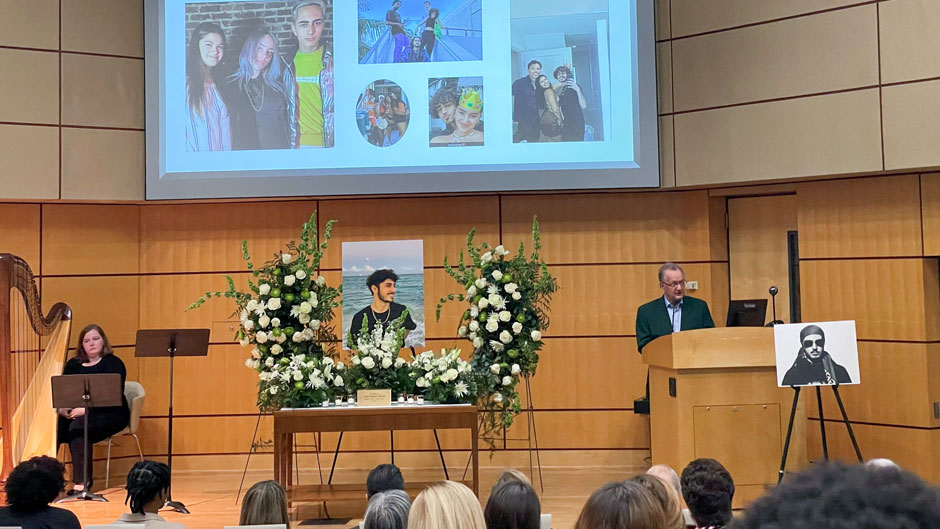Marco Armand Darvish, a third-year business school student who passed away in late June, was remembered at an emotional memorial service in Storer Auditorium on Tuesday for a range of remarkable qualities—academic brilliance, boundless creativity, mischievous free spirit, generous friendship—yet it was his tenacious passion for justice that stood out above all others.
That fearless willingness to stand up for the rights of others and to argue respectfully will serve as Darvish’s legacy through the Marco Darvish Memorial Endowed Scholarship and Award in Legal Studies and an accompanying current scholarship, both gifts established by his mother, Mimi Darvish.
John Quelch, dean of the University of Miami Patti and Allan Herbert Business School, welcomed the many guests who attended the special memorial. Harpist Molly Stein and singer Thando Mamba, both Frost School of Music student musicians, provided the musical interlude.
Even as a toddler, Darvish demonstrated an extraordinary persistence to argue his point, his mother said. By the time he was a teenager, he had coupled that tenacity with superior debating skills.
“If Marco believed in something, he was very persistent about proving his point,” his mother recalled. “And he wouldn’t argue in a typical parent-child way—it would be more like a debate to the point that I would just have to sit there and look at him and say, ‘You know, you’re right.’”
An incredibly precocious child—though he was younger than his peers, Darvish’s teacher at his Montessori School in Texas suggested moving him into first grade as he’d already surpassed the requisites of the older 5-year-olds. He expanded his horizons when he and his mother moved to Washington, D.C. In middle school and even more so in high school, Darvish became engaged in issues of global equity—serving on school clubs and helping initiatives.
He fostered a sense of that dedication to fairness and equity through listening to his mother’s stories. Of Iranian descent, she grew up in the United States and experienced discrimination during middle and high school, at a time when the revolution was taking place in Iran and hostilities were high between the two countries.
Pursuing his dream to live in New York City, Darvish was accepted to study at New York University (NYU) while still 17. Yet, after little more than a year, and when NYU moved to remote learning because of the COVID-19 pandemic, he accepted his mother’s invitation to visit her in Miami and consider attending the University.
He fell in love with the University of Miami, the city, and enjoyed the chance to be close to his mother and spend time with her. After enrolling here and beginning courses, he began to prosper.
“Marco was always an advocate for others and very outspoken, but here on campus he matured and seemed to experience life in a different way. He became more and more passionate for the issues he cared about,” his mother said.
Though he was passionate and full of vitality, Darvish was still not sure of his career direction until he took a business law course with Patricia Abril, professor and chair of the Business Law Department.
At the memorial service, Abril shared that one of her most gratifying moments as an instructor is seeing students light up in terms of discovering their academic direction or their calling. “With Marco it wasn’t a lightbulb going off, it was more like Las Vegas lighting up,” Abril said.
When he approached her with a proposal for a term paper—a case for a rap artist who died prematurely and his mother’s efforts to negotiate his posthumous intellectual property—Abril was wowed by the complexity of his approach.
“I encouraged him to do it, though he needed no encouragement—he was a house on fire and there was nothing that was going to stop him,” she pointed out.
The finished paper—27 pages single-spaced—was so superlative from a legal and negotiations standpoint that Abril shared it with a colleague, who then used it as a case study for the course the following semester. Darvish was invited to teach the case to the students, which he did, and it was met with acclaim.
Abril offered Darvish a teaching assistant position last fall and nominated his paper to be presented at the annual conference of the Academy of Legal Studies in Business. The two were scheduled to travel together to Louisville, Kentucky, in July to present.
“His passing a month before rocked my world as it did that of my faculty, staff, and students. Even students who had never met Marco knew about him and the Backstreet Records case,” Abril shared as part of her testimony at the memorial service.
For Darvish’s mother, the creation of an endowed chair in legal studies is a way to preserve his memory by supporting the dreams of others. The scholarship supports students majoring in legal studies who are actively engaged in social advocacy or civil rights.
“Marco was always the strength and support—the voice—for others. Whether through political comments or speaking for his friends or standing up for me, he had this deep strength that everyone around him felt,” she said. “I don’t get to see my son becoming everything that he could have or would have in this life, but through this scholarship we get to support the success of others. It’s what he would have wanted to do.”

